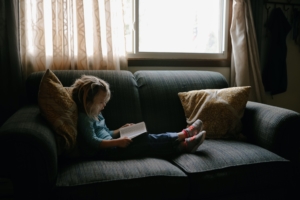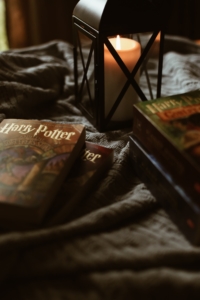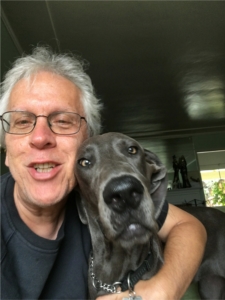The Best Kind of Magic

Books have been some of the best friends I’ve ever had. They’ve kept me company when I was lonely, taken me on great adventures, helped me explore other cultures and worlds, and given me deep insight into myself and the Universe. But one of the most precious gifts I have received through reading books is healing – spiritual and emotional healing. I’m not talking about self help books, spiritual works, or other similar tomes. For me, when I read literature I connect to, under the right circumstances, a kind of magic happens. I’ve been able to experience emotions I was otherwise unable to handle because those feelings and their underlying memories had been too painful to feel.
Life is messy. I grew up in an alcoholic home and faced physical, emotional, and spiritual abuse. My father beat me. When I was eight my parents would leave me in charge and go out drinking. When I was nine I would have to drive us home from family dinner parties because they were too drunk. Later, I became alcoholic. I crashed cars, struggled through college, and destroyed an early career. Later still, my wife and I couldn’t have children. That damaged us emotionally and financially. It took us ten years to dig ourselves out, and we still carry the wounds. Through it all, reading fiction was a steadying force, a place of calm, and every once in awhile, a catalyst for healing.
Art, including literature, is a place where emotions can be explored, felt, and faced in a safe way that promotes healing. Technically, this is known as a holding environment, and has specific applications in psychotherapy, business transitions, and art therapy. But the experience of reading a book, going to a concert, or wandering through the halls of a museum, can provide the container, the holding environment that an individual might need to experience those emotions that have been out of their reach. The experience can be cathartic, a sudden realization or change in attitude, or, as in my case, the healing can develop over time. It needs to happen in a way that makes sense to the individual. This is a very intimate and personal process. It’s not just patching up old wounds either. In my experience, this healing gave me a new attitude and outlook on life, a restoration of balance, which provided me with a way to live life on a firmer basis than I had experienced previously.
My teen years were difficult. I had a few friends, but social interaction was difficult for me. Early in my high school career I had this television that came on right away. That doesn’t seem like a big deal now, but in the early 1970’s, when you turned on the TV you had time to go into the kitchen and get a soda, or just sit there and be depressed until the stupid thing lit up. That instant on feature was a life saver for me. So my routine was, I would buy or borrow the “TV Guide” every week, write down all the shows I wanted to watch, and then watch them. I was pretty lonely, but that was one of the ways I dealt with my emotions.
 I’m not sure exactly when I started reading seriously, but by the time I was twelve or thirteen, I was a reading a lot. In my senior year of high school, I discovered Siddhartha, by Hermann Hesse (the Hilda Rosner translation, which I still prefer). The book is about a young man, a Brahmin’s son, who questions everything. He leaves his home and lives in the forest. He encounters the Buddha and is impressed but feels there is something missing. As his life proceeds, he becomes a wealthy man then leaves all that and spends a long number of years running a ferry across a river, living simply off the meager pay he receives from the many travelers who pass through. I traveled with him; through his long life until, in the hut by the river, he became the river, the mountain, the sea, and all the creatures and people touched by the water, all those that had traveled through. And when his childhood friend Govinda, who himself had spent his life as a monk in search of Truth, kissed Siddhartha’s forehead, I wept, stunned as Govinda was, seeing the same eternal beauty emanating from and through Siddhartha, a beauty that existed in myself and all of those I knew, had known, and would know.
I’m not sure exactly when I started reading seriously, but by the time I was twelve or thirteen, I was a reading a lot. In my senior year of high school, I discovered Siddhartha, by Hermann Hesse (the Hilda Rosner translation, which I still prefer). The book is about a young man, a Brahmin’s son, who questions everything. He leaves his home and lives in the forest. He encounters the Buddha and is impressed but feels there is something missing. As his life proceeds, he becomes a wealthy man then leaves all that and spends a long number of years running a ferry across a river, living simply off the meager pay he receives from the many travelers who pass through. I traveled with him; through his long life until, in the hut by the river, he became the river, the mountain, the sea, and all the creatures and people touched by the water, all those that had traveled through. And when his childhood friend Govinda, who himself had spent his life as a monk in search of Truth, kissed Siddhartha’s forehead, I wept, stunned as Govinda was, seeing the same eternal beauty emanating from and through Siddhartha, a beauty that existed in myself and all of those I knew, had known, and would know.
Experiencing the spiritual transcendence of Siddhartha in a deeply emotional and personal way was part of what led me to building a new attitude towards my life. When I was twenty, I took a year off from college. I was still living at home and had to leave that room and its tiny little television. I wasn’t doing well in school, anyway. I moved to Santa Barbara, California, where I started college again with a fresh and new outlook built, in part, on having lived the experience of change and transcendence through Siddhartha. I got involved in life, like Siddhartha had, eventually became president of the board of directors of a large student housing cooperative. I can’t ascribe all of that to reading Siddhartha, but that story remains an important part of my own story.
 Years later, in the aftermath of my experience with my wife, I couldn’t read fiction at all. Losing a pregnancy and not being able to have another was more than I could handle emotionally. I didn’t want to feel anything, good or bad. In fact, I wanted to die every day for two and a half years. Reading was just too much because, when you read, you feel. I went into therapy and started a new career, not because I felt any real connection to the work, I just needed something to do. But as time passed, the stark objectiveness of my life started to wear on me, and I was drawn back to the written word. I was saved, in part, by Harry, Ron, and Hermione, three young wizards and their lives at Hogwarts School of Witchcraft and Wizardry. Their power, love, and courage in the face of death inspired me. I fell into the world of Harry Potter, created by J.K. Rowling, and was, once again, able to read, feel, and live more fully. Experiencing the varieties of loss in those pages let me know I wasn’t alone. Also, I loved Hogwarts. I felt comfortable amongst the people (and the creatures) there, the camaraderie, the friendships, and the rigor of academic life. That fictional experience translated into my lived experience. I began playing music again after drifting away from it. I also started writing short stories which led me to decide to go back to school and get an MFA. Harry Potter helped me reconnect with my creative self in a way I thought was no longer possible.
Years later, in the aftermath of my experience with my wife, I couldn’t read fiction at all. Losing a pregnancy and not being able to have another was more than I could handle emotionally. I didn’t want to feel anything, good or bad. In fact, I wanted to die every day for two and a half years. Reading was just too much because, when you read, you feel. I went into therapy and started a new career, not because I felt any real connection to the work, I just needed something to do. But as time passed, the stark objectiveness of my life started to wear on me, and I was drawn back to the written word. I was saved, in part, by Harry, Ron, and Hermione, three young wizards and their lives at Hogwarts School of Witchcraft and Wizardry. Their power, love, and courage in the face of death inspired me. I fell into the world of Harry Potter, created by J.K. Rowling, and was, once again, able to read, feel, and live more fully. Experiencing the varieties of loss in those pages let me know I wasn’t alone. Also, I loved Hogwarts. I felt comfortable amongst the people (and the creatures) there, the camaraderie, the friendships, and the rigor of academic life. That fictional experience translated into my lived experience. I began playing music again after drifting away from it. I also started writing short stories which led me to decide to go back to school and get an MFA. Harry Potter helped me reconnect with my creative self in a way I thought was no longer possible.
Reading hasn’t been the sole cause of healing or motivator of change, but it has provided a crucial spark. I don’t connect with everything I read. Some stories pass through me, some leave mere traces, and others have a more lasting impact. Reading isn’t always easy for me. It can take me awhile to get into a story. Sometimes, I forget which character is which and have to go back and dig around until I remember. But there comes a moment in most stories when I stop struggling, when I have become familiar with the characters and their world, when I fall into that reality and embrace it as my own. When that happens, the textures, assumptions, and imaginings of my everyday life fall away, and I come to inhabit this new reality, one which includes both worlds. The story becomes my own, a real part of my life. It is then that what was once only possible can become real.
 I struggled through a good part of my MFA program. In our third term, we were required to do a critical paper where we research and discuss some aspect of writing or the written word. I couldn’t get into it. Up to that point in the program, every time I sat down to write I was overwhelmed. In my mind, everything I wrote had to be GOOD, it had to be LITERARY, and it had to CHANGE THE WORLD. It was crushing and the prospect of the critical paper only made that worse. Then, early that third term, I read The Wild Robot, by Peter Brown. This is a children’s book. It has pictures and everything. It’s the story of Roz, a robot who finds herself on a remote island and must figure out a way to survive in a natural wilderness. She learns how to communicate with the animals she meets, builds their trust and friendship, and comes to live among them as one of their own. It’s a wonderful book that changed my life. I don’t know that it was a lightning bolt cathartic experience, but it was FUN. Reading and writing suddenly became something I could have fun with again. I am a fan of the Grateful Dead, and they became a big part of my critical paper. I had a blast quoting song lyrics and band members, weaving them into a story about healing and joy that was transformational for me. The critical paper was my best work during the course of my MFA program.
I struggled through a good part of my MFA program. In our third term, we were required to do a critical paper where we research and discuss some aspect of writing or the written word. I couldn’t get into it. Up to that point in the program, every time I sat down to write I was overwhelmed. In my mind, everything I wrote had to be GOOD, it had to be LITERARY, and it had to CHANGE THE WORLD. It was crushing and the prospect of the critical paper only made that worse. Then, early that third term, I read The Wild Robot, by Peter Brown. This is a children’s book. It has pictures and everything. It’s the story of Roz, a robot who finds herself on a remote island and must figure out a way to survive in a natural wilderness. She learns how to communicate with the animals she meets, builds their trust and friendship, and comes to live among them as one of their own. It’s a wonderful book that changed my life. I don’t know that it was a lightning bolt cathartic experience, but it was FUN. Reading and writing suddenly became something I could have fun with again. I am a fan of the Grateful Dead, and they became a big part of my critical paper. I had a blast quoting song lyrics and band members, weaving them into a story about healing and joy that was transformational for me. The critical paper was my best work during the course of my MFA program.
Reading can provide us with so much. Not only can it help us heal old wounds, it can also help us be more creative, build empathy, and even get a good night’s sleep. When my imagination bonds with that of the writer, possibility and hope are born. But for healing to happen, I have to be open and willing. I have to want to let go of whatever it was I was holding on to – whether it was resentment, fear, blame, or grief – so space can be made for balance and, ultimately, for joy. It is through sharing the journey with the artist and their characters that their pain becomes mine; their joy becomes mine. Through this process, I’m able to feel what I couldn’t feel before and work through the traumas I have experienced and held onto. In this way, I can take this new state of being into my lived experience because, what had once been too painful becomes something I have already lived through, accepted, and transcended in a real way. The pain becomes a memory and is replaced by a new willingness to move forward in my life. Through reading, I am not alone, and I carry this certainty and joy into my life outside of the books. The healing is real. Reading really is the best kind of magic.
Robert Kirwin is a writer and multi-dimensional human with an MFA in Creative Writing from Antioch University, Los Angeles. The first draft of his first novel is waiting for him to start on the second draft. He has been rejected by some of the most prestigious publications in the world and continues to submit work wherever and whenever he can. He lives in Los Angeles, CA with his tolerant wife, their dog, and two cats who keep a watchful eye on everything.





